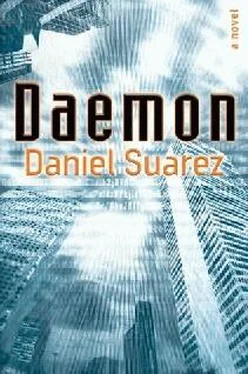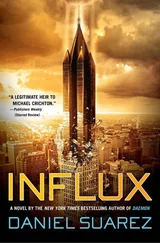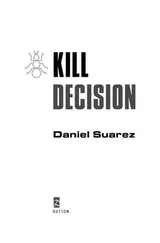“Ross. I have a twelve-cylinder A8—drives like a dream—but I want to get a second car. Something smaller and sportier.”
“And you’re familiar with the SL roadster?”
Ross examined the silver car nearby. “A golf buddy of mine has one. I’ve done some research, but the truth is, if I like the way it feels I’ll buy it today. No financing necessary.”
The salesman nodded. “Let’s take it for a spin. I’ll just need a photocopy of your driver’s license.”
Ross drew his wallet. “Of course.”
The platinum cards were clearly visible as he offered his license to the salesman.
* * *
Natalie Philips stood in the car rental company’s parking lot and stared at the car Ross had rented an hour before. She had tracked Ross’s cell phone through E911, only to find it riding to Oxnard on the back of a truck. Ross’s rented subcompact was never driven off the rental lot. And nobody in the Task Force had thought to look for it here—especially with his cell phone on the move.
Trear pounded the roof of his car. “Damnit! This guy’s probably halfway to Mexico by now.”
Philips turned to him. “Halfway isn’t all the way. Besides, he still needs transportation, and we have all the airports, train stations, and bus stations staked out. If he makes any ATM withdrawals or credit card purchases, we’ll be on top of him in minutes. There’s a strike team airborne in the L.A. basin as we speak.”
Trear grabbed a radio, but looked to Philips. “This Ross imposter was most likely Sebeck’s go-to man for computer work. Maybe even the mastermind of this hoax.”
“You mean if the Daemon is a hoax.”
“It’s definitely a hoax, and I don’t think Sebeck was smart enough to pull it off—much less to conceive of it. But our imposter just might be.”
Philips nodded, even though it made less sense the more she thought about it.
* * *
Ross ditched the Mercedes salesman off the 23 freeway in Simi Valley. He exited the freeway, claiming a bathroom emergency, and never returned after rushing into a restaurant to use the restroom. Instead, he ducked out a side exit and walked over one block to a row of nondescript, corrugated metal box garages.
He pulled out his key ring and cycled through the keys for a moment. Then he unlocked the garage door padlock and pulled up the door to reveal a late-model white utility truck with side cargo panels. A logo on the door read “Lasseter Heating & Air.” Ross flicked the garage light switch then ducked inside, lowering the door behind him.
There was about six feet of space on either side of the vehicle. Ross moved alongside and opened one of the cargo panels, revealing a mirror hanging on the inside of the door. There was a toiletry bag and a change of clothes. He pulled a wallet out from under the clothes and flipped it open to reveal a California driver’s license with his picture on it. The name read “Michael Lasseter.” In the picture he was bald as a billiard ball. He lined up the mirror and pulled an electric shaver out of the toiletry bag. He looked for the single electric socket up by the overhead light.
In ten minutes or so, he was completely bald. Clumps of dark hair covered the floor. He examined himself in the mirror and rubbed his bald scalp.
“Я надеюсь, что твои волосы вырастут опять.”
It felt strangely good to speak his native language again. And bad, too. This place wasn’t supposed to be needed.
He emptied Jon Ross’s wallet and placed the credit cards and identification on a hot plate. He powered it up and kept working as the acrid smell of melting plastic filled the space.
He changed into jeans and a work shirt.
When he finished he looked at himself in the mirror. He stopped and grabbed a bottle of rub-on tan, then smeared it over his face, neck, and arms. He took another look at Lasseter’s license photo. Much better.
Jon Ross was dead. Long live Michael Lasseter.
He hid Ross’s clothes and the toiletry bag in a tool bench cabinet, then unplugged the hot plate. He checked to be certain that Ross’s ID and credit cards were completely melted. It was a multicolored puddle. He took one last look around, then opened the garage door.
The sun was suddenly blinding. He got into the truck and started it up. He sat there pondering for a moment. He was confident he’d get past any roadblocks, but what then?
Sobol was sharper than he expected—and he was expecting a lot. Sobol had destroyed Sebeck somehow and made everyone believe the Daemon was a hoax. Why? Some milestone had been achieved, and the Daemon was moving on to the next task. He knew there was a reason for framing Sebeck, but he just couldn’t wrap his head around it. Why make the Daemon famous and then turn around and make people believe it didn’t exist again?
He drummed his fingers on the steering wheel.
One thing was for sure: he’d be damned if the Daemon was going to defeat him. It might have defeated Jon Ross, but it had never even heard of Michael Lasseter.
In the corner boardroom of building OPS-2B, the group of agency directors reconvened. In the windowless room it was impossible to tell whether it was night or day. And from the government décor it was impossible to tell whether it was 1940 or 2040.
DIA: “I caught the news on the way in. They’re saying the Daemon is a hoax. Is that true?”
FBI: “The money trail leads to two people that we know of. Detective Sebeck, now in custody, and one Cheryl Lanthrop, a medical executive. We thought we found her in Kuala Lumpur, but our intel was bad.”
There was silence for a moment.
NSA: “Let me get this straight: you’re telling me that Detective Sebeck and this Lanthrop woman turned Sobol’s estate into a high-tech death trap?”
FBI: “Tax records show Lanthrop was sales director for a string of MRI labs owned by Matthew Sobol. He appears to have become obsessed with MRI technology in the latter stages of his illness. E-mail records show her advising Sobol to invest in a functional MRI business in which she was part owner. She sounds like a kook. Her specialty was neuromarketing research—examining the brain activity of people viewing various consumer products.”
NSA: “You didn’t answer the question.”
CIA: “Where does Sebeck come in?”
FBI: “We’re not sure yet, but credit card records show Lanthrop staying at the same hotels where Sebeck attended law-enforcement seminars. They also traveled to Grand Cayman together. Lanthrop set up an offshore bank account there for a holding company that later held short positions in CyberStorm Entertainment stock. We have video of Lanthrop and Sebeck sitting at a bank manager’s desk. Sebeck’s wife had no knowledge of this trip.”
NSA: “How do Sebeck and Lanthrop build an automated Hummer or an electrocution trap in the CyberStorm server farm? I mean, how would they get access to CyberStorm?”
FBI: “We’re still putting the pieces together. There may be more people involved. Possibly even Singh and Pavlos. We found deleted files on Sebeck’s computer. They include lists of equipment and a draft power of attorney later signed by Matthew Sobol—probably after dementia incapacitated him. That power of attorney placed part of Sobol’s assets under the control of an offshore corporation in which Sebeck held a controlling interest.”
CIA: “Am I the only person who thinks this is a load of horseshit?”
NSA: “No.”
FBI: “If you read the report—”
CIA: “Hang on a second. This is too far-fetched. You’re telling me that these two managed to swindle Sobol out of forty million dollars in loans—but that they didn’t just take the money and run. Instead, they bought stock on margin and orchestrated a shorting scam? Hell, a Wall Street banker might have been able to do it, but not some yokel cop and his girlfriend.”
Читать дальше












